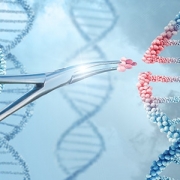BRCA: beyond breast cancer
New evidence shows that BRCA variants may increase the risk of stomach and pancreatic cancers in both men and women
The fact that both BRCA genes are associated with other types of cancer is not new. Ovarian cancer has long been associated with variants in these genes, and this blog reported on a 2019 paper that provided evidence for their implication in some prostate cancers.
That paper, from the Institute of Cancer Research in London, showed that men with a BRCA2 variant were more likely to get prostate cancer and to be affected at a younger age and have more aggressive tumours than prostate cancer patients without the variant. A new study supports those findings, as well as highlighting newly discovered associations.
BRCA genes
It is perhaps unsurprising that we are finding new links between BRCA1 and BRCA2 and more types of cancer. Although these genes were named for the breast cancers with which they are most closely linked, the function of these genes is far from specific to breast tissue.
Like everything in our bodies, our DNA can get damaged. Without repair, this can cause errors to accumulate, meaning that the cell will die or, more rarely, become cancerous. The BRCA genes code for proteins that help repair broken DNA in our cells, making these outcomes less likely.
Some BRCA variants cause the proteins to be less effective at repairing DNA, however, meaning that it is more likely that cancer-causing changes to the DNA will go undetected.
Stomach and pancreatic cancer
The new study, published in the Journal of Clinical Oncology shows that in addition to breast, ovarian and prostate cancers, BRCA variants are also associated with increased risk of stomach and pancreatic cancer.
The researchers looked at data from over 5,000 families with a BRCA1 or BRCA2 variants for associations with 22 different kinds of primary cancers.
From this data, the researchers estimated that men with a BRCA2 variant have more than twice the risk of developing prostate cancer by age 80, but that men with a BRCA1 variant appeared to have the same risk as men with no BRCA variants. They also found that carrying a harmful BRCA1 or BRCA2 variant more than doubled the risk of getting pancreatic cancer.
“The link between BRCA2 and prostate cancer and pancreatic cancer is now much clearer, thanks to the data we’ve analysed. We have also identified a potential link with stomach cancer, but this is based on small numbers and needs further study,” said one of the authors, University of Cambridge professor of medical genetics and honorary consultant Professor Marc Tischkowitz.
The researchers did not find a link between BRCA variants and other types of cancer including melanomas, however, which was suspected based on results from previous, smaller studies.
Harmful BRCA variants are rare, affecting around 1 in 300-400 people, making them more difficult to investigate than more common ones. Studies such as this one allow us to better understand the risks associated with these variants, and therefore help inform screening and genetic counselling for affected people and families.
–









